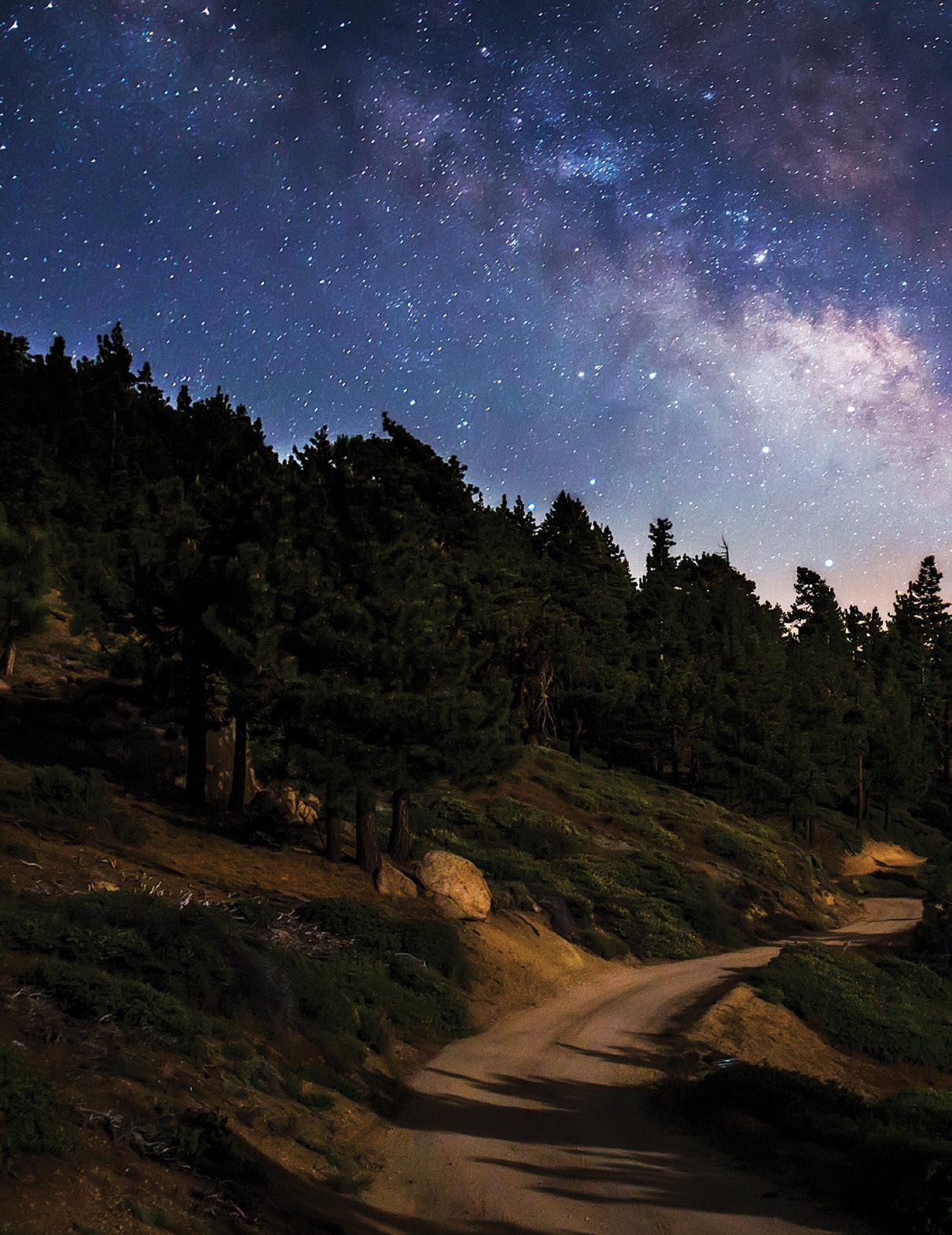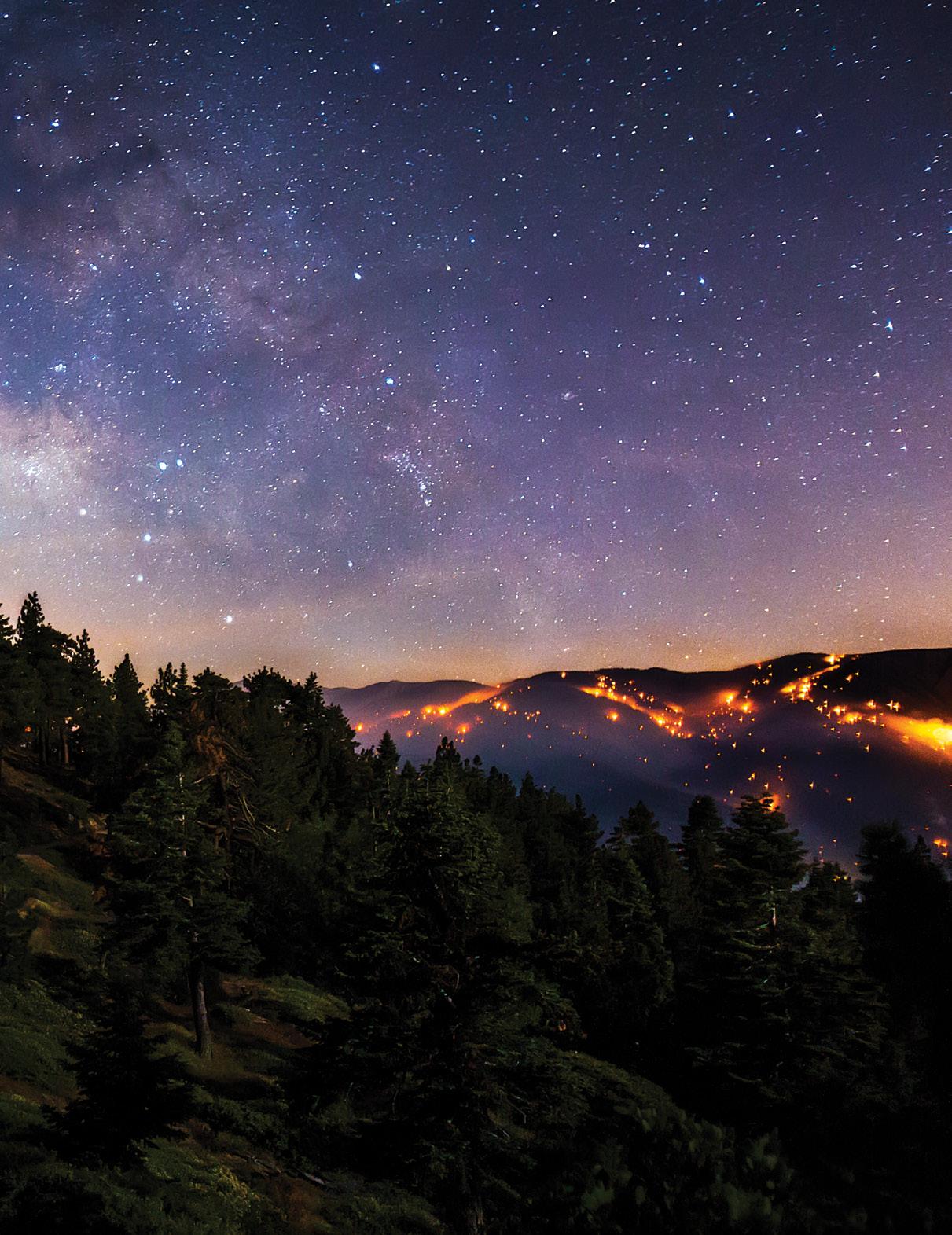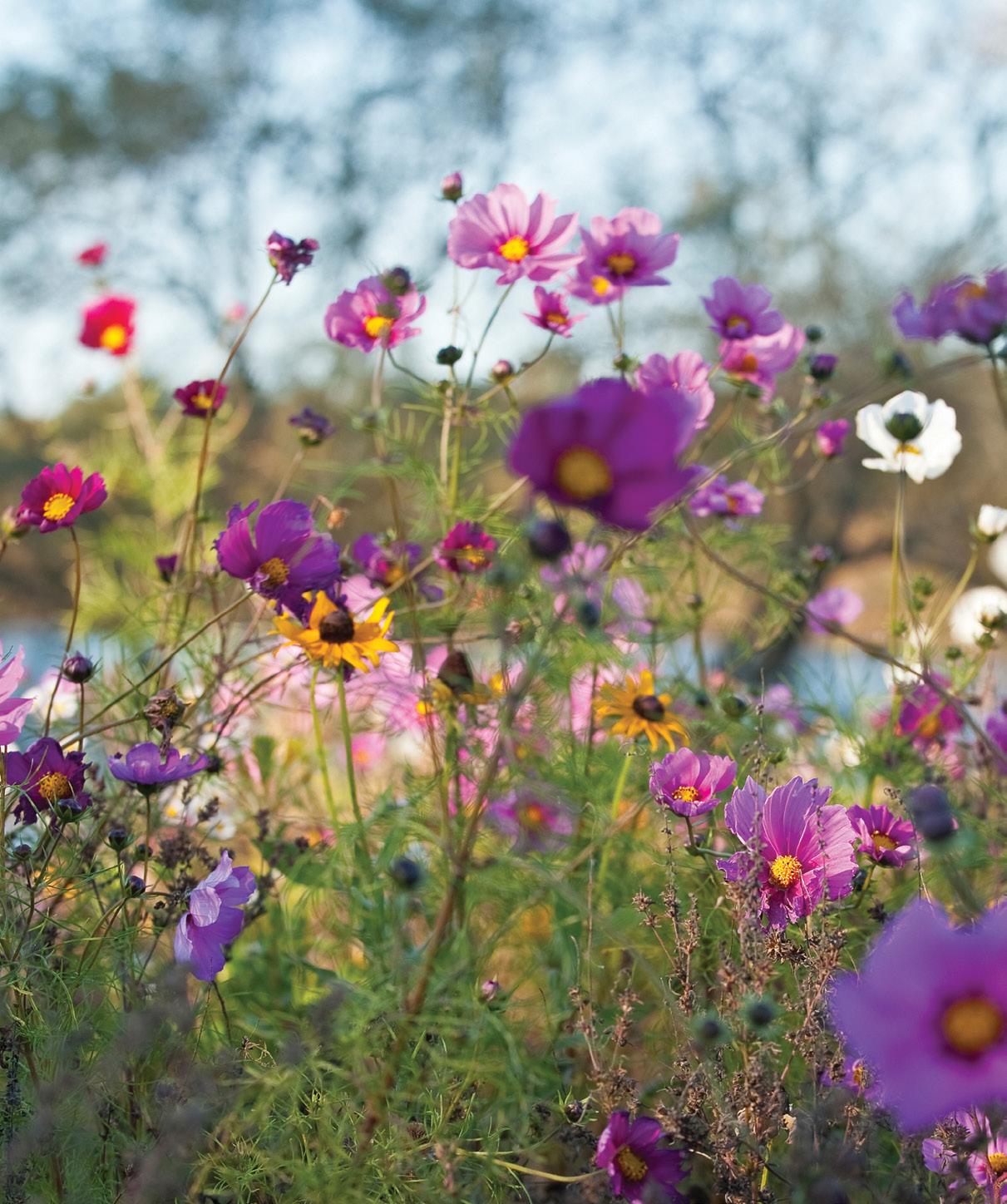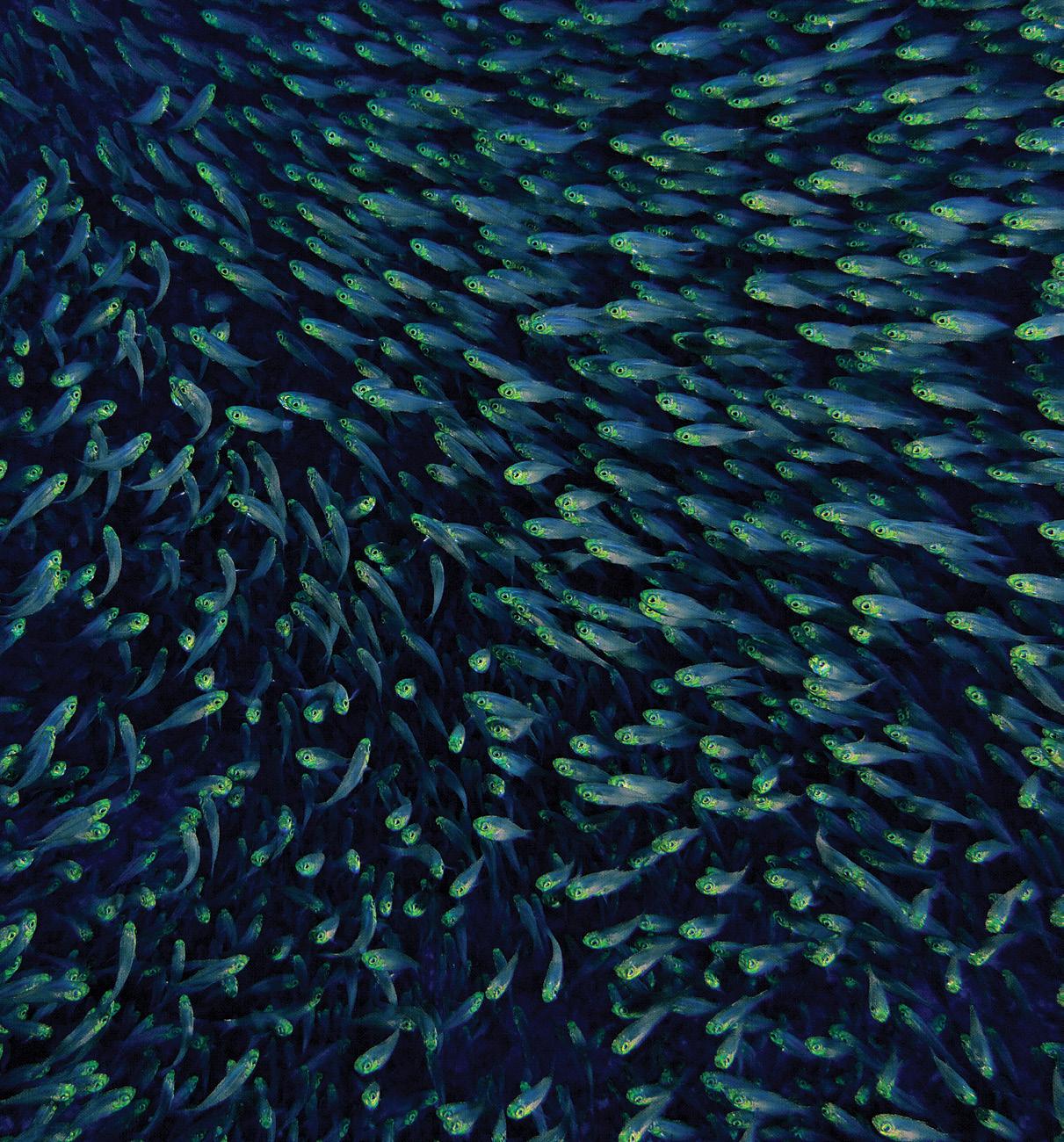
7 minute read
to the wild wake up
Wilderness expert and renowned mindfulness teacher Mark Coleman shares how he is learning to hold the intense beauty of nature—and devastation of climate change—in perspective.

Advertisement

As I start out on one my favorite trails, it takes a while for my senses to open up, but soon I feel embraced into a luminous world, welcomed by innumerable shades of green, tall grasses shimmering, trees swaying in the breeze, and shafts of sunlight peering through the thick canopy. Below me, a family of quail dart in and out of the bushes.
As I crest the hill, I feel the invigoration of the cool wind, blown in fresh from the Pacific. I inhale deeply and smell the bite of the salty ocean air, which feels like a homecoming, familiar and welcoming. It seems to blow the dullness from my mind, and I sense how nature invites us to connect and feel our way into a larger sense of self.
We tend to think of consciousness as skin bound, brain tethered. However, in nature we can sense something vaster—and that something larger senses us. And from here our perception and understanding transforms: We start to think from this bigger perspective.
Mindful Awareness in Nature
For over 15 years, I have led Awake in the Wild retreats in places such as the islands in the Sea of Cortez in Baja, Mexico, the Sierra Nevada mountains in California, and the red rock canyons in Arizona. Participants immerse themselves in the beauty of wilderness for a week of silence and meditation and become transformed by the process. Through the portal of mindful awareness, they are developing an intimate connection with the natural world that is both sublime and insightful. They come to sense how embedded they are within the fabric of life and its ecosystems.
I teach my nature-based meditation work, in part, because we have lost the art and ability to know how to be in nature. We are mostly busy doing nature. We are conquering the mountains, beating our best time on a run, chatting with friends on a walk, listening to music on headphones, or simply spaced out, daydreaming or lost in thought.
ABOUT THE AUTHOR
Mark Coleman is a mindfulness meditation teacher, nature guide, author of Make Peace with Your Mind and Awake in the Wild and founder of the Mindfulness Institute. An “inner and outer explorer,” Mark likes nothing more than sharing his passion for integrating nature and meditation and has led wilderness meditation retreats from Alaska to Peru. He lives in Marin County.
Although I believe any time in the outdoors is time well spent, what we do with our mind while we are outside is significant. With mindfulness training, we learn that in any moment we can shift attention from the stressinducing thought realms—the brain’s default mode network—into the visceral present. We can attune to our senses and see how they support present-moment awareness. We realize the body and its sensory nature are always present. By practicing outside, we discover how nature constantly allures our awareness to its beauty, → complexity, diversity, and simple miracles. Or we can discover what Wendell Berry notes in his poem “The Peace of Wild Things” as he steps outdoors: “For a time I rest in the grace of the world, and am free.”

Nature’s Invitation
Nature also provides innumerable counterpoints to stress. For our cramped, pressured, cubicle lives, we can feel a magnificent sense of space as we behold the boundlessness of the night sky or the vastness of the ocean. For our senses—dulled by screens and monotone offices—we can drink in a thousand colors of the pebbles and sands at the beach or shades of green as we walk in the woods.
For the pervasive anxiety and stress that runs through our nervous system, we can access the tranquility of trees, streams, and wildflower meadows. We can attune to the gentle deer who embody a grace and dignity as they move through a landscape. For our heart made heavy by sadness and grief, we can be touched and comforted by the simple joys of bluebells blooming in woodlands, the fleeting hummingbird as it floats by, or the billowing clouds lit up at sunset.
Nature’s teaching also provides a perspective that we all too easily forget. As we watch scarlet maple leaves drop in the fall, it reminds us of the importance of letting go, of release. Walking in a woodland in the dead of winter, we behold the natural rhythms of dormancy, and remember there are seasons of flourishing and times to rest and rejuvenate. Seeing fields of once-golden blooms of sunflowers now withering in autumn, we remember that beauty and joy also have their seasons, their ebb and flow.
Nature always invites our attention and offers so much to our depleted hearts and minds. The question now is: Will we accept the invitation? What’s at stake if we don’t is not just our personal well-being. Our collective health—and perhaps even the survival of our entire species— seems to hang in the balance.

Feeling the Reality of Change
As I continue my hike along the crest of the hill, I suddenly realize the view is not the crystal clarity I have come to expect. There is a haze in the valleys below, blurring boundaries and obscuring the horizon. I begin to smell an acrid smoke that strangely blows in from the ocean. The smoke comes from the raging fires further north, burning in the Pacific Northwest and British Columbia. Although originating more than a thousand miles away, these plumes, carried by Pacific thermals, blow into California. It is the all-too-constant reminder that not all is well in the world, however beautiful the nature that surrounds me.
Today, because of climate crisis and changing ecology, the sense of finding nature as source of nourishment is changing. We now live in an era where the impacts of global warming—unprecedented forest fires, species extinction, coral reef deaths—are impossible to ignore. Our very experience of nature is tinged, if not marred, by these looming realities.
I have hiked in three mountain ranges in 2018: in the Rockies, the Sierra Nevada, and the Alps. In each place I walked, visibility was affected by a smoky haze from nearby or distant forest fires. In the same year, California witnessed two utterly tragic fires. One, the Camp Fire, incinerated the entire town of Paradise, destroying up to 18,000 homes, forcing more than 52,000 people into some phase of homelessness. Simultaneously, the Woolsey fire, near Malibu, ravaged hillsides and homes alike. The Camp Fire spewed smoke that stretched for hundreds of miles up and down California, blanketing entire cities with toxic smoke. It was described as the hottest and fastest moving fire in history. The intensity fueled by the drought conditions were a direct result of climate change.
Similarly, friends who like to snorkel and dive lament the diminishing coral reefs. Alpine climbers witness the high mountain glaciers → disappearing year after year. Oceans that were once teeming with fish are now depleted. The remaining fish drift in gigantic garbage patches, some as large as the state of Texas.
Our grief and pain about such things is harder to push aside. The results of the climate crisis are mounting, becoming an enervating presence where once we drew pure pleasure and deep replenishment. Instead of relishing the majestic trees, abundant wildflowers, or breathtaking views, we confront drought conditions, flooding, or the smoky haze of distant forest fires. Our heart may feel heavy and weary or helpless at the scope of the problem.
The Australian eco-psychologist Glenn Albrecht coined a new term for this: solastalgia. It is a part of an emerging lexicon in the mental health field that endeavors to address the distress and anxiety that occurs in relation to the ecological crisis. Solastalgia, composed of two Greek words, solacium (comfort) and algia (pain), refers to the distress caused by environmental damage and speaks to the grief, sadness, and despair that arises in response to the current environmental devastation. Instead of joy there is a hopelessness, a knowing that what is loved is now under threat.
People feel solastalgia in response to mountaintop mining from the Blue Ridge Mountains to Western Australia. It is felt when one sees the vast forests in the West scorched by fires. It is stirred when there are mass beachings of dolphins or whales or when blooming red tides in Florida stifle marine life. Sailors feel it when drifting past islands of plastic in the Pacific. Farmers know it in their bones when droughts crush their wheat harvests.
When I recently came across this term, it articulated something I’ve felt for some time. It speaks to my changing experience in nature. In the past, nature had always been an unending source of nourishment, joy, wonder, and love. Now it is often tinged with sadness, grief, or loss at what is happening to species, habitat, oceans, and rivers. It is now impossible to ignore. What does this mean for countless people who have gone to the woods for refuge and resilience? What are the dire consequences for vulnerable peoples and species the world over?
Of course, I am also aware this grief is not new. Indigenous cultures and First Nations peoples have felt it for centuries. They have and continue to witness ecological devastation of their homelands through land confiscation, drilling, mining, deforestation, and the monocrops of agribusiness. They perhaps are more vulnerable to the consequences of climate change, whether that be declining fish stocks, melting ice in the Arctic, or changing migration patterns. Our current tears are part of a river of tears that has been flowing for a long time.
Practice with Paradox
For me, as for any nature-loving meditator, this presents a challenging dilemma. How do we continue to open our hearts to the beauty of the natural world when doing so means we also feel the deep pain of losing what we love?
As I sit by the ocean, I can revel in the silky surface of the water, the light catching the crest of waves, and be mesmerized by its restless beauty and vast power. Yet I also can’t help thinking of the creatures that lie within it: the diminishing shoals of tuna and dwindling populations of porpoises.
Whenever my heart feels torn in this way, I remember that where we habitually place our heart and mind becomes our natural inclination. What we focus on determines to some degree our sense of well-being. We can’t ignore the ecological crisis. We are here because society has refused to look squarely at this complex problem. However, does it serve the greater good to dwell only on the catalog of data about climate change? Such single-pointed focus can lead to despair, hopelessness, and worse.
On my walk I can dwell on the smoke, the acrid smell, the diminished visibility, and the destruction those fires bring. Or I can shift my attention to what is not burning up. To the →







